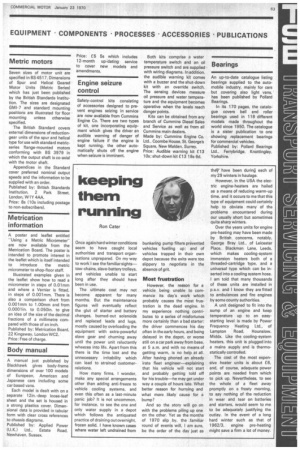keeping them running
Page 65

If you've noticed an error in this article please click here to report it so we can fix it.
Ron Cater Once again hard winter conditions seem to have caught local authorities and transport organisations unprepared. On my way to work I see the familiar sightstow-chains, slave-battery trolleys. and vehicles unable to start long after they should have been in use.
The ultimate cost may not become apparent for many months. But the maintenance figures will eventually reflect the glut of starter and battery changes, burned-out solenoids and replaced leads and lugs, mostly caused by overloading the equipment with extra-powerful slave gear and churning away until the power unit reluctantly wheezes into life. Apart from this there is the time lost and the unnecessary irritability which can lead to strained customerrelations.
How many firms, I wonder, make any special arrangements other than adding anti-freeze to vehicle cooling systems. and even this often as a last-minute panic job? It is not uncommon, for instance, to see the one and only water supply in a depot which follows the antiquated practice of draining out overnight, frozen solid. I have known cases where water left undrained from bunkering pump filters prevented vehicles fuelling up: and of vehicles trapped in their own depot because the exits were too slippery to negotiate in the absence of grit.
Most frustration
However, the reason for a vehicle being unable to commence its day's work which probably causes the most frustration is the dead engine. In my experience nothing contributes to a series of misfortunes more certainly than a bad starter: the driver commences his day often in the early hours. and being delayed in the depot, or worse still on a car park away from base, at 5 a.m. and with no means of getting warm, is no help at all. After having phoned an already irate fleet engineer—explaining that his vehicle will not start and probably getting told off for his trouble—he may get under way a couple of hours late. What better reason for hurrying and what more likely cause for a bump?
And so the story will go on with the problems piling up one on the other. Yet as the months of 1970 slip by, the familiar round of events will, I am sure. be the order of the day just as their have been during each of my 29 winters in haulage.
However, in the USA the electric engine-heaters are hailed as a means of reducing warm-up time. and it occurs to me that this type of equipment could certainly help to obviate many of the problems encountered during our usually short but sometimes quite sharp winters.
Over the years units for engine pre-heating may have been made by British concerns, notably, George Bray Ltd., of Leicester Place. Blackman Lane. Leeds, which makes cooling-system immersion heaters both of a threaded-cartridge type, and a universal type which can be inserted into a cooling system hose. I am told that many thousands of these units are installed in p.s.v. and I know they are fitted to ambulances and fire engines by some county authorities.
A unit designed to fit into the sump of an engine and keep temperature up to an easystarting level is made by Power Frequency Heating Ltd., of Lampton Road. Hounslow, Middx. Like the cooling-system heaters, this unit is plugged into a mains supply and is thermostatically controlled.
The cost of the most expensive heater units is about £6, and, of course, adequate power points are needed from which to pick up. Nevertheless, to see the whole of a fleet away promptly on a frosty morning, to say nothing of the reduction in wear and tear on batteries and starters, would seem to me to be adequately justifying the outlay. In the event of a long hard winter such as that of 1962/3, engine pre-heating might save a firm a lot of money.








































































































